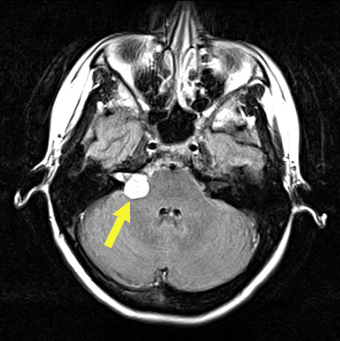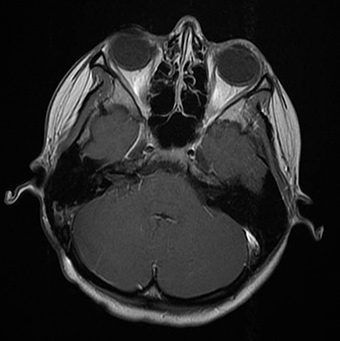
Haley's story
Acoustic Neuroma
Her 'migraines' were in fact something else
Haley had been suffering from headaches, nausea, dizziness, and fatigue for several years before she learned the true source of her pain and discomfort. Initially diagnosed with migraines, she was doing everything possible to stop the headaches, including following a "migraine diet." When she was unable to cope with the symptoms any longer, she returned home from college and saw a new doctor. Her problem, revealed by an MRI, was an acoustic neuroma (vestibular schwannoma), a benign tumor that had wrapped itself around her vestibular nerve, a cranial nerve that affects our sense of balance and head position. The tumor was just a bit smaller than a golf ball. There was significant pressure on the adjacent brain stem.
Acoustic neuroma: Haley's story
Haley had no auditory symptoms, which makes her case fairly unusual. This is typically a first sign of an acoustic neuroma. She was also younger than most patients who present with this diagnosis.

MRI, before surgery - The tumor was just a bit smaller than a golf ball.

MRI, after surgery - Tumor removed.
Treatment paradigms were discussed; they included observation, radiation therapy, or surgical removal. Given her young age and the large size of the tumor, surgical removal was the favored choice. Haley underwent a successful retrosigmoid craniotomy by Vince DiNapoli, MD, PhD, a neurosurgeon with Mayfield Brain & Spine and Director of the Brain Tumor Center at The Jewish Hospital – Mercy Health, and Joseph Breen, MD, a neuro-otologist.
Haley spent a month regaining her sense of balance, which was affected by the sectioning of the "balance" nerve during tumor removal. During recovery, the brain is able to re-learn and pay sole attention to the remaining nerve on the other side. Haley also retained her hearing on the affected side, despite having some tinnitus. She has no facial weakness and says she is "back to a complete, normal life."
Hope Story Disclaimer -"Haley's story" is about one patient's health-care experience. Please bear in mind that because every patient is unique, individual patients may respond to treatment in different ways. Results are influenced by many factors and may vary from patient to patient.

